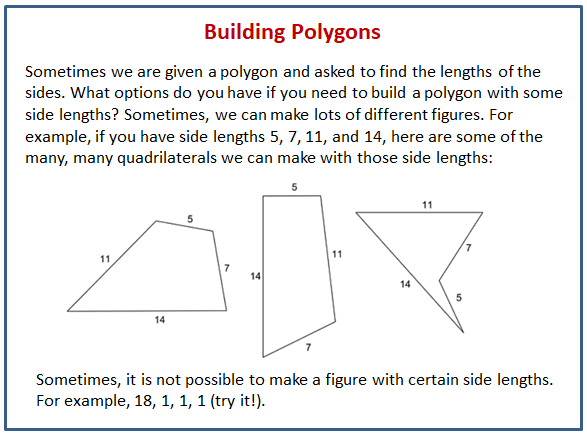Illustrative Mathematics Grade 7, Unit 7, Lesson 6: Building Polygons (Part 1)
Learning Targets:
- I can show that the 3 side lengths that form a triangle cannot be rearranged to form a different triangle.
- I can show that the 4 side lengths that form a quadrilateral can be rearranged to form different quadrilaterals.
Related Pages
Illustrative Math
Grade 7
Lesson 6: Building Polygons (Part 1)
Let’s build shapes.
Illustrative Math Unit 7.7, Lesson 6 (printable worksheets)
Lesson 6 Summary
The following diagrams explain how to build a polygon when given the side lengths.

Lesson 6.1 True or False: Signed Numbers
Decide whether each equation is true or false. Be prepared to explain your reasoning.
Lesson 6.2 What Can You Build?
- Use the segments in the applet to build several polygons, including at least one triangle and one quadrilateral.
- After you finish building several polygons, select one triangle and one quadrilateral that you have made.
a. Measure all the angles in the two shapes you selected. Note: select points in order counterclockwise, like a protractor.
b. Using these measurements along with the side lengths as marked, draw your triangle and quadrilateral as accurately as possible on separate paper. Open Applet
Lesson 6.3 Building Diego’s and Jada’s Shapes
- Find the unknown angle measures. Show your thinking. Organize it so it can be followed by others.
a. Diego built a quadrilateral using side lengths of 4 in, 5 in, 6 in, and 9 in.
b. Build such a shape. - Is your shape an identical copy of Diego’s shape? Explain your reasoning.
a. Jada built a triangle using side lengths of 4 in, 5 in, and 8 in.
b. Build such a shape. - Is your shape an identical copy of Jada’s shape? Explain your reasoning. Open Applet
Lesson 6.4 Building Han’s Shape
Han built a shape using side lengths of 3 in, 4 in, and 9 in.
- Build such a shape.
- What do you notice?
Lesson 6 Practice Problems
- A rectangle has side lengths of 6 units and 3 units. Could you make a quadrilateral that is not identical using the same four side lengths? If so, describe it.
- Come up with an example of three side lengths that can not possibly make a triangle, and explain how you know.
- Find x, y, and z.
- How many right angles need to be put together to make:
a. 360 degrees?
b. 180 degrees?
c. 270 degrees?
d. A straight angle? - Solve each equation.
- a. You can buy 4 bottles of water from a vending machine for $7. At this rate, how many bottles of water can you buy for $28? If you get stuck, consider creating a table.
b. It costs $20 to buy 5 sandwiches from a vending machine. At this rate, what is the cost for 8 sandwiches? If you get stuck, consider creating a table.
The Open Up Resources math curriculum is free to download from the Open Up Resources website and is also available from Illustrative Mathematics.
Try the free Mathway calculator and
problem solver below to practice various math topics. Try the given examples, or type in your own
problem and check your answer with the step-by-step explanations.

We welcome your feedback, comments and questions about this site or page. Please submit your feedback or enquiries via our Feedback page.